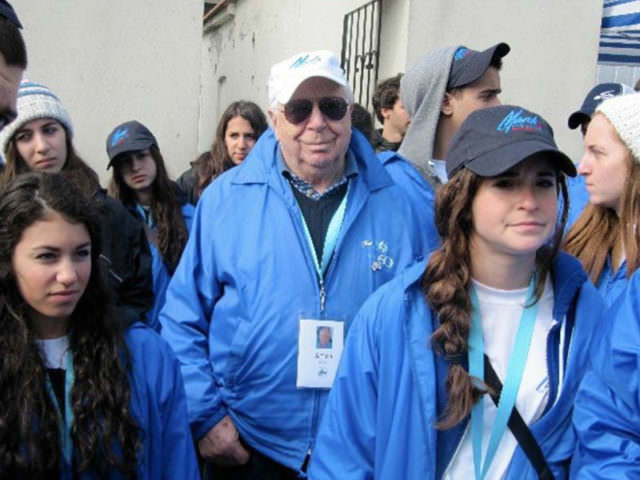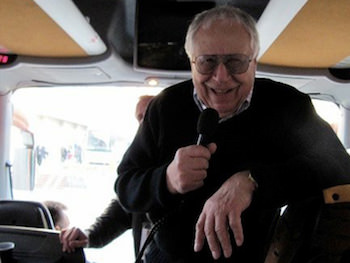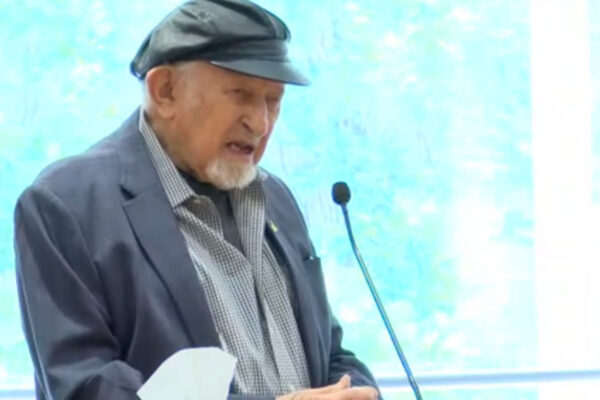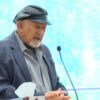
Amek Adler on a March of the Living trip in 2010. JESSICA TAYLOR PHOTO
CJN – At 89, Abram (Amek) Adler had ambitious plans for the future. His Holocaust memoir, Six Lost Years, had just been published and the official launch of the book was scheduled for May 25, followed by a national book tour in the fall. On April 24, Adler was on the road in Saskatchewan. It was Yom Hashoah (Holocaust Remembrance Day), and he had been speaking to high school students about his wartime experiences. He had just addressed a group of young people in Humboldt and had travelled to Regina for another speaking engagement when he took ill.
Rushed to hospital, doctors determined they had no choice but to operate immediately in what they said was a very risky procedure. Adler agreed, but early the next morning, a few hours after being admitted to hospital, Adler died in the operating room.
Jody Spiegel, director of the Azrieli Foundation’s Holocaust Survivor Memoirs Program, was accompanied on the Saskatchewan trip with two of her colleagues from the organization.
“He was a gentleman, kind and thoughtful about everybody else,” she recalled. “He was amazing.”
Adler’s wife, Ruth, and children, Rose and Barry, were contacted, but there was no time for them to get to the hospital before the surgery, Spiegel said.
Adler, who celebrated his 89th birthday less than a week before his death, grew up in Lublin, Poland, later moving to Lodz. He survived ghettos, labour and concentration camps and forced marches in which many others were killed. His mother was deported to Auschwitz, but survived. His father and brother were killed at Dachau. Adler escaped a mass shooting of Jewish prisoners just before American forces arrived to liberate them in April 1945.
After the war, Adler travelled to Palestine and served in the Jewish armed forces. He later moved to Sweden, where he met his wife, and entered the fur business. In 1954, the family moved to Toronto, where Adler would succeed in the fur industry and the jewelry business, becoming president of the Canadian Jewellers Association in 1989.
Like many survivors, Adler was reluctant to discuss the war for many years. That attitude changed with time. About 20 years ago, he was interviewed for Steven Spielberg’s USC Shoah Foundation and, in recent years, he was a participant in the March of the Living, in which survivors accompany high school students to Poland to visit concentration camps and tell their stories. He also spoke frequently to youngsters in schools across the Canada. Of the country’s 10 provinces, Saskatchewan was the last in which Adler described the events of his youth.

Amek Adler speaking on a March of the Living tour bus several years ago
Adler was inspired to complete his memoir, published as part of a series by the Azrieli Foundation, by his late friend Alex Levin, who he knew through Jewish War Veterans of Canada. Levin had written his own book about his wartime experiences and influenced Adler, Spiegel said.
Telling his story became Adler’s “mission,” she added.
Humboldt, a small community about 220 kilometres north of Regina, hosted 550 students and educators from surrounding rural areas for the Horizon School Division’s Third Annual Holocaust Symposium.
“The students had read the memoir. They were excited to meet him. He was like a celebrity,” Spiegel said.
“Sharing his story is what he did. That’s what his mission has been for the last 20 years, since he shared his story with Spielberg’s Shoah Foundation,” she added.
Eli Rubenstein, national director of March of the Living Canada, said, “We will all miss Amek’s energy, his passion and his ready smile. And while we are all heartbroken, his story will live on in each one of us – student and adult – who were privileged to meet and learn from this wonderful man.”
Discover Humboldt, a local news and information website, reported that Adler told students, “We must not forget. That’s the only way we can fight for [the] future is enlightening people and helping people learn about what happened.”
And in what might have been a foreshadowing of his own demise, the Holocaust survivor went on to say, “The story cannot die. We are dying. We won’t be around, so hopefully the new generation can tell the next generation.”
Cathy Mills, a teacher who attended Adler’s last lecture, wrote to the Azrieli Foundation to express her condolences.
“Could you please let Amek’s family know that he spoke so well and made such an impact on the students and teachers gathered there,” she wrote. “His final day on this earth was productive and inspirational. That is a legacy of which to be proud.
“Amek reminded the students of the importance of taking the time to listen to survivors and the importance of education. His words will resonate with me and with them for a long time,” she stated.
Originally published in The Canadian Jewish News







